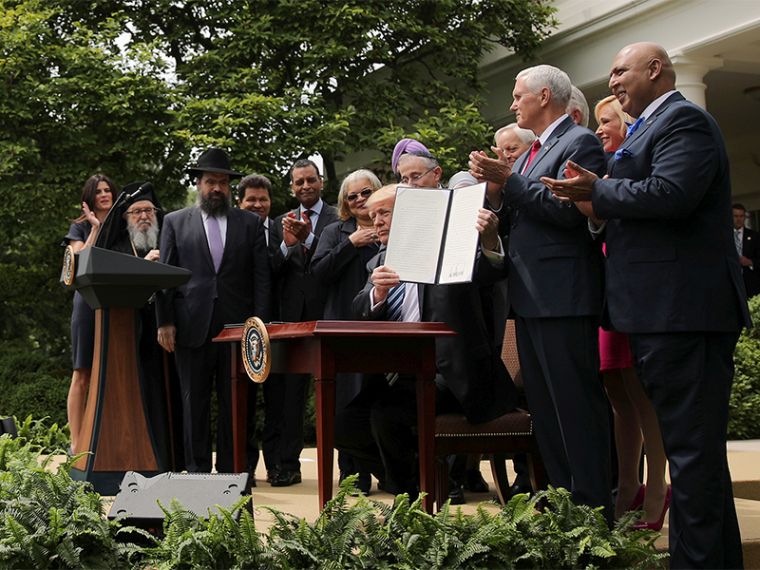'Woefully inadequate': Religious leaders react to Trump's religious liberty order

Attempting to fulfil one of his key election pledges, President Donald Trump has signed an executive order that he says will protect religious freedoms in America. While some religious leaders praise the legislation, others say it is 'woefully inadequate'.
In an event with various faith leaders at the White House, Donald Trump yesterday signed an order that will target the Johnson Amendment, legislation which bars tax-exempt non-profits, including churches, from endorsing political candidates.
The order also seeks regulatory relief for 'religious objectors to Obamacare's burdensome preventive services mandate', which required that all employers provide birth control/contraceptive services.
'For too long the federal government has used the power of the state as a weapon against people of faith, bullying and even punishing Americans for following their religious beliefs,' Trump said yesterday, according to RNS.
'No one should be censoring sermons or targeting pastors...we are giving our churches their voices back,' he said.
The order does not go nearly as far as a leaked draft order from January, which had offered freedom for religious groups who object to LGBT anti-discrimination laws, such as Christian employers who refused to provide particular services for gay couples.
The reaction from religion commentators has been mixed.
Some have praised to move to challenge to the federal contraceptive mandate, with the Little Sisters of the Poor saying they were 'grateful for the president's order and look forward to the agencies giving us an exemption so that we can continue caring for the elderly poor and dying' without fear of government reprimand, Catholic News reported.
The order was celebrated by Trump ally Robert Jeffress, and Hispanic church leader Samuel Rodriguez said it would end the 'subversive oppression' of Christians in the US.
According to One News Now, Tony Perkins of the Family Research Council said the order would begin to reverse the punishment of Christians 'simply living according to their faith'.
Dr Jerry Johnson of National Religious Broadcasters said much was missing from the order, but it should be praised as an 'emergency brake on the government's movement toward coercion and discrimination'.
In years of conversations w/religious leaders worried about their institutions' liberties, Johnson amendment has literally never come up.
— Ross Douthat (@DouthatNYT) May 4, 2017
Michael Farris of Alliance Defending Freedom was more mixed: 'President Trump's executive order provides hope...that he will move fully toward fulfilling his promise to protect religious freedom for countless Americans. 'Regrettably, this executive order leaves that promise as yet unfulfilled....Though we appreciate the spirit of today's gesture, vague instructions to federal agencies simply leaves them wiggle room to ignore that gesture, regardless of the spirit in which it was intended.'
David French described the move as 'constitutionally dubious, dangerously misleading, and ultimately harmful to the very cause that it purports to protect,' in an analysis for National Review. 'In fact, he should tear it up, not start over, and do the actual real statutory and regulatory work that truly protects religious liberty.' Ryan Anderson, conservative critic and founder of the Heritage Foundation said it was 'woefully inadequate'. Former Obama faith adviser Michael Wear was highly critical of the order, and ahead of the signing probed the potential conflict the loosening of the Johnson amendment could bring:
Imagine a church needs approval from local zoning cmte to plant new church. Mayor asks pastor, "have you endorsed me from your pulpit yet?"
— Michael Wear (@MichaelRWear) May 3, 2017
The American Civil Liberties Union had planned to sue against the legislation, but later said that 'the order signing was an elaborate photo-op with no discernible policy outcome'.
Princeton Professor Robert George was unambigious. On Twitter he called the move 'meaningless. No substantive protections for conscience. A betrayal. Ivanka and Jared won. We lost.'











